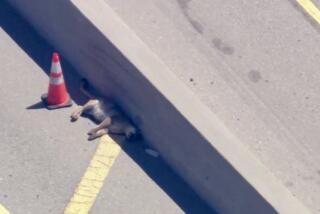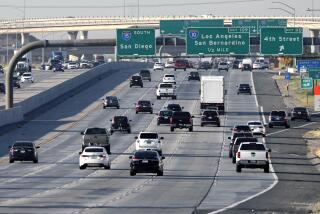Death on the highways
- Share via
Re “Road kill,” Opinion, Aug. 5
Thank you for Gregg Easterbrook’s eye-on-the-road piece about the way traffic-related fatalities are given far less consideration than other fatalities. There was a time when driving was enjoyable, then it became a chore and eventually downright lethal. With such staggering statistics of driving fatalities recorded over relatively short periods of time, it’s easy to understand why cars are sometimes referred to as “metal coffins.”
In a region like Southern California, where the potential for traffic injury or death is especially acute, the body count will continue to rise as severe overpopulation continues to put more stress on an aging infrastructure. Easterbrook identifies several contributing factors (higher horsepower engines, aggressive driving, cellphone use) but neglects to address the pedal-to-the-metal irresponsibility of overdevelopment as one of the leading causes of this ongoing blood bath.
Richard Douce
Long Beach
--
There’s no arguing with Easterbrook when he says that nearly a quarter of a million people have died in motor vehicle accidents in the U.S. since 9/11. There is no denying that last year 1.2 million people worldwide stopped breathing because they were involved in some sort of vehicle mishap.
I will argue against laws mandating common sense. It’s very simple: There is a natural selection process going on. Some people will always choose to endanger themselves. Unfortunately, sometimes they involve the rest of us. When that 520-horsepower Porsche Cayenne sneaks past you on the right and then cuts you off, rest assured that one day that vehicle will look like a sausage on the end of a shish kebab. That is, the 90-foot telephone pole I’m towing down the highway to replace the one the other unsafe driver just ran into. Drive safely -- it works.
Brian Hessman
Thousand Oaks
--
First Easterbrook says no one seems to care about all the traffic fatalities, then later he points out that we’ve come up with all kinds of safety devices to help prevent those deaths. We are constantly searching for ways to make our vehicles and roads more safe, and it is working. In 1957, we had 38,500 traffic fatalities nationally, and a little bit of research would show that there were probably far less than half as many vehicles on the road at that time. I’m sure the fatalities per passenger mile are far fewer today than they were then.
Also, the reason auto fatalities don’t generate the same outrage and attention as a terrorist attack like 9/11 should be obvious to the most naive observer. Accidents are just that: accidents. Terrorist attacks are the intentional, wanton slaughter of innocent people for no good reason other than to express hatred.
Francis R. Wilcox
Bisbee, Ariz.
More to Read
Sign up for Essential California
The most important California stories and recommendations in your inbox every morning.
You may occasionally receive promotional content from the Los Angeles Times.












